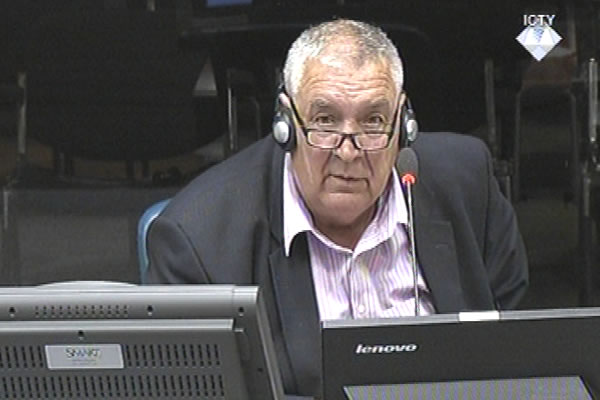Home
LIFE IN GRBAVICA: HELL AND HARMONY
Zdravko Salipur, former member of the Crisis Staff of the Serb municipality of Novo Sarajevo, testified at the trial of Ratko Mladic today. Salipur said that life in Grbavica was ‘hell’ because of the constant shelling and sniping from BH Army positions. On the other hand, in his statement to the defense Salipur depicted the life led by the non-Serbs there as ‘harmonious’. According to Salipur, Bosniaks and Croats enjoyed all the rights and freedoms
 Zdravko Salipur, svjedok odbrane Ratka Mladića
Zdravko Salipur, svjedok odbrane Ratka Mladića Mladic’s last defense witness before the Tribunal’s summer recess is Zdravko Salipur, who was a member of the Crisis Staff of the Serb municipality Novo Sarajevo during the war. Before the war, Salipur lived in the Pofalici neighborhood. In his statement to Mladic’s defense, Salipur said that from Pofalici he was able to see members of the Patriotic League and Green Berets digging trenches and distributing weapons at night.
As Salipur recounted, Pofalici, predominantly Serb-inhabited neighborhood, was attacked on 16 May 1992. About 60 Serbs, mostly civilians, were killed in the attack and some of them are still missing, Salipur claimed. According to Salipur, there was no justification for the attack. The Serb police and Territorial Defense kept watch to prevent the Patriotic League and Green Berets from entering the neighborhood. Bosniaks and Croats were allowed to move freely, to go to work and back home.
Through this witness, the defense wants to corroborate the allegation that in fact the Sarajevo Serbs were under siege during the war. Salipur described life in Grbavica as ‘hell’. There were demarcation lines on three sides of the neighborhood, and the shelling and sniping were constant. According to Salipur, fire opened from the BH Army position on Debeli Vrh further up from Grbavica was particularly ‘lethal’.
In his statement to the defense, Salipur claimed he didn’t know anything about the Serb leadership plans to ‘group together’ the territories the Serbs claimed as theirs through the process of regionalization and to carve out those territories by force and annex them to Serbia. Prosecutor Jason File confronted the witness in the cross-examination with an intercepted conversation from November 1991, in which Radovan Karadzic and the then president of the Novo Sarajevo Executive Board Zarko Djurovic discussed the issue. Salipur claimed he knew nothing about those conversations.
In the statement Salipur argued that life of non-Serbs in Grbavica was ‘harmonious’. According to the witness, non-Serbs ‘enjoyed all the rights and freedoms’. This prompted the prosecutor to refer to a report produced by the UN peace-keepers in late September 1992. The document describes the deportation of about 300 Muslims from Grbavica. Although Salipur lived in the very part of Grbavica where the deportation took place, he claimed that he didn’t know anything about the incident.
Prosecutor File played a video excerpt in which the witness was able to identify the Chetnik warlord Slavko Aleksic. ‘I know for sure that his unit was part of the VRS’, Salipur said. According to Salipur, the fact that the members of that unit saw themselves as part of the Chetnik movement was ‘a different matter altogether’.
Ratko Mladic’s trial will resume after the Tribunal’s summer recess, on Monday, 10 August 2015.
Linked Reports
- Case : Mladic
- 2015-07-15 CRIMES PAVED WAY TO SERB STATE IN BH
- 2015-07-14 NO PUNISHMENT FOR CRIMES IN BOSNIAN KRAJINA
- 2015-07-13 OFFICER OF ‘EUROPE’S LARGEST CORPS’ DENIES CRIMES
- 2015-08-10 CONTESTING CLAIMS ON CULTURAL HERITAGE DESTRUCTION
- 2015-08-11 WAS DESTRUCTION OF MOSQUES ‘HAPHAZARD’ OR ORGANIZED?
- 2015-08-12 COMMANDER AT WEDDING, TROOPS AT EXECUTION SITES
